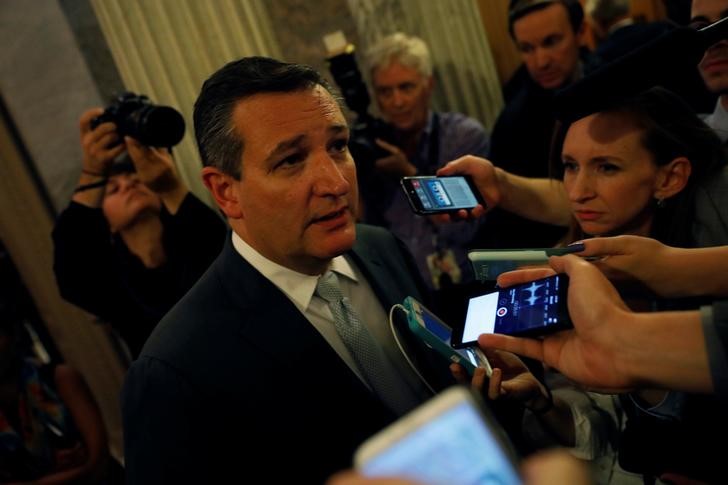By Richard Cowan
WASHINGTON (Reuters) - A proposal by U.S. Republicans to repeal and replace the Obamacare health insurance program suffered serious new setbacks within the party on Sunday, when Senator Ted Cruz expressed his opposition and Senator Susan Collins dug in with strong criticism of the legislation.
Two other Republican senators, John McCain and Rand Paul, already said last week they would vote against the so-called Graham-Cassidy bill. One more "no" vote among Republicans would effectively kill the party's latest effort in their seven-year mission to overturn Obamacare, while dealing a new blow to President Donald Trump.
Senate Majority Leader Mitch McConnell, a Republican, has said he "intends" to put the bill up for a vote this week, but he has withheld public comment over the past few days as some of his rank-and-file Republicans abandoned Trump.
Treasury Secretary Steven Mnuchin, interviewed on CNN's "State of the Union," reflected the uncertainty in the battle.
"It is going to be very close. I hope it passes," he said.
Phil Novack, a spokesman for Cruz, confirmed that the Republican senator said at an event in Texas: "Right now, they don't have my vote, and I don't think they have (Senator) Mike Lee's vote, either."
Lee is a conservative Republican and close ally of Cruz. A spokesman for Lee said the senator wanted "some technical changes" to the legislation, but did not provide details. "We haven't committed to anything yet," Conn Carroll said in an email.
Politico reported that Cruz complained that the latest Obamacare repeal bill did not address his concerns about bringing down the costs of healthcare.
On Friday, news of McCain's opposition sent shares of health insurance companies up. Centene ended 1.6 percent higher and Humana (NYSE:HUM) closed up 0.2 percent.
Trump has pressured his fellow Republicans for quick passage on what would be his first victory on major legislation. All Democrats are expected to vote against it.
COLLINS SUPPORT IN DOUBT
But Collins, perhaps the most moderate of Republican senators, appeared poised to oppose her party's latest replacement plan for the Affordable Care Act, former Democratic President Barack Obama's signature legislative achievement.
She, along with McCain and Alaska Senator Lisa Murkowski, voted in July against an earlier version of Obamacare repeal.
"It is very difficult for me to envision a scenario where I would end up voting for this bill," Collins said on CNN's "State of the Union" on Sunday, two days after saying she was "leaning against" the legislation.
Collins said her concerns centered on the impact the legislation would have on the federal Medicaid program, which helps disabled children and low-income elderly people get healthcare.
The Senate, which Republicans control by 52-48, faces a Saturday deadline for deciding on the bill under an expiring rule that lets the healthcare proposal pass with just a simple majority in the 100-member chamber, instead of the 60-vote threshold needed for most legislation.
Paul, interviewed on NBC's "Meet the Press," attacked the centerpiece of the Republican bill that would have the federal government basically turn the health insurance system over to states in the form of "block grants."
“They could remove the block grants from it, and we can vote on what we actually agree on,” Paul said. “I can’t in good conscience vote to keep all the spending."
Some key Senate Republicans were still pushing to forge ahead.
Senator Lindsey Graham, who is leading the charge on the latest version of Obamacare repeal, told ABC he believed he would have the votes to pass the legislation.
"The only way you know how people will vote is you have the vote," he said.

Graham did not detail the path he sees to victory.